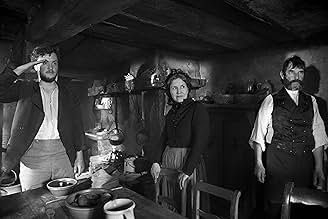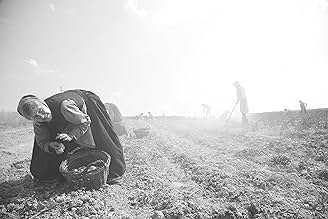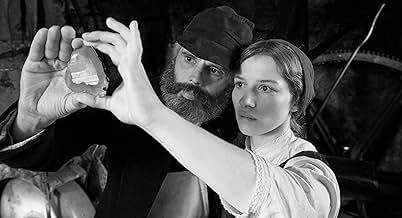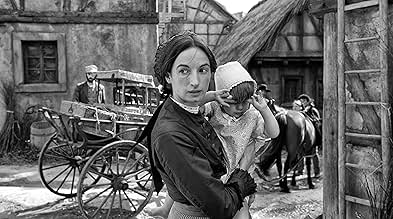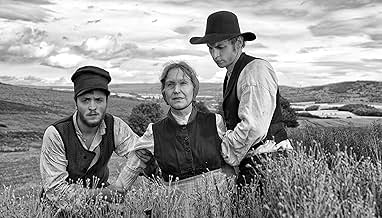Heimat: Chronique d'un rêve
Titre original : Die andere Heimat: Chronik einer Sehnsucht
NOTE IMDb
7,9/10
1,6 k
MA NOTE
Ajouter une intrigue dans votre langueJakob longs for a new life for himself and his troubled family in Brazil.Jakob longs for a new life for himself and his troubled family in Brazil.Jakob longs for a new life for himself and his troubled family in Brazil.
- Réalisation
- Scénario
- Casting principal
- Récompenses
- 9 victoires et 8 nominations au total
Avis à la une
A cinematic recapitulation of his canonical Heimat (roughly can be interpreted as "homeland") mini-series (three chronological installments encompassing a totol 30 episodes, released in 1984, 1993 and 2003 respectively), which conscientiously survey the shifting ethos of Germany from mid-19th century till the millennium through families dwelling in a fictitious Hunsrück village called Schabbach, octogenarian New German Cinema veteran Edgar Reitz's latest edition marks his first feature film in 35 years, on top of its whopping 225-minutes running time.
HOME FROM HOME is au fond a prequel, sets its time-frame precisely from 1840 to 1844, and the cynosure here is a geeky adolescent boy Jakob Simon (Schneider), the youngest son of a blacksmith family in the village, who is not cut from the same cloth like his peers, for example his elder brother Gustav (Scheidt), and is often called on the carpet by their parochial father Johann (Kriese) for shirking day-to-day drudgery. Jakob is an avid bookworm and is weaned on the vast world purveyed by other people's words and imagination, he begins to envisage a life beyond his home-bound hardscrabble status quo (the area is constantly plagued by crop failure, harsh weather and pandemic illness), specifically, to emigrate to Brazil, for that purpose, he even masters the language of a particular tribe of South-American Indian, and often effuses about it with sheer elation, say, in front of Jettchen (Bill), the corn-fed girl he cottons to.
Little does Jakob know, what kismet lays in store for him is diametrically opposite of that ideal, the Grim Reaper sporadically assails the family either by abrupt fits or after a chronic affliction; Jettchen, who takes a jollification-addled fancy on Gustav, a hammer blow directly precipitates Jakob's self-inflicted prison stint, ends up becoming his sister-in-law; but the last straw renders Brazil a castle in the air is the filial duty that befalls him when Gustav and Jettchen pre-empt his own pending migration, a muddy fraternal grapple turns out to be the best solution to blow off their steam.
Jakob stays, and life continues with its unchanged pace, he settles for Florinchen (Lembeck), Jettchen's comely thick-as-thieves friend he likes but not exactly loves, his erudition finally earns the respect from Johann, who also mends fences with Lena (Fouché), his daughter, Jakob and Gustav's sister who has been cut off from the family because she marries a man of a different religious persuasion, in the end of the day, Reitz's time-honored sense of perspective about life, time and humanity hits the mark with distinction.
Sensibly and relentlessly, Reitz adopts a sedate rhythm to the meandering narrative and characterizes a lyrical nostalgia (enhanced by Michael Riessler's protean score conveying emotions with high fidelity) which beautifully pervades this saga from stem to stern. The film is shot in an aesthetically mind-blowing monochrome (which anticipates Ciro Guerra's mesmerizing EMBRACE OF THE SERPENT 2015, that could be providentially welcomed as an otherworldly answer to Jakob's unfulfilled longing), which is ingeniously if economically interspersed with eye-catching polychromatic touches: a golden coin, an agate keepsake, a German flag, fire blazing a horseshoe, the tail of an arcing comet, two varicolored garlands, roadside blue berries or other floral variations, all pregnant with Reitz's divine acuity of discerning and accentuate beauty in both sweeping landscape and quotidian rigors with his reductive idiom. Thematically, HOME FROM HOME adheres to Reitz' humanism precept which precludes it from degrading into an eye-level pastoral, and incontrovertibly, he has been inculcated with the same humble naturalism which is in the veins of his coevals like Jan Troell and Ermanno Olmi, while anchoring this film in the signs of its time like diaspora, privation and disillusion, Reitz tops it off with a well-earned serenity to patch up with the aftermath of a dashed dream and bereavement.
Although the film is not necessarily an actor's showpiece, and newcomer Jan Dieter Schneider's central performance is a bit of a curate's egg, one real trouper should be name-checked, the leading actress in the first Heimat series, Marita Breuer, understatedly returns as Margarethe, the hard-working and loving mother of the household, and feeds this estimable roman-fleuve an affecting sentiment that echoes its auteur's own monody towards mortality and permanence.
HOME FROM HOME is au fond a prequel, sets its time-frame precisely from 1840 to 1844, and the cynosure here is a geeky adolescent boy Jakob Simon (Schneider), the youngest son of a blacksmith family in the village, who is not cut from the same cloth like his peers, for example his elder brother Gustav (Scheidt), and is often called on the carpet by their parochial father Johann (Kriese) for shirking day-to-day drudgery. Jakob is an avid bookworm and is weaned on the vast world purveyed by other people's words and imagination, he begins to envisage a life beyond his home-bound hardscrabble status quo (the area is constantly plagued by crop failure, harsh weather and pandemic illness), specifically, to emigrate to Brazil, for that purpose, he even masters the language of a particular tribe of South-American Indian, and often effuses about it with sheer elation, say, in front of Jettchen (Bill), the corn-fed girl he cottons to.
Little does Jakob know, what kismet lays in store for him is diametrically opposite of that ideal, the Grim Reaper sporadically assails the family either by abrupt fits or after a chronic affliction; Jettchen, who takes a jollification-addled fancy on Gustav, a hammer blow directly precipitates Jakob's self-inflicted prison stint, ends up becoming his sister-in-law; but the last straw renders Brazil a castle in the air is the filial duty that befalls him when Gustav and Jettchen pre-empt his own pending migration, a muddy fraternal grapple turns out to be the best solution to blow off their steam.
Jakob stays, and life continues with its unchanged pace, he settles for Florinchen (Lembeck), Jettchen's comely thick-as-thieves friend he likes but not exactly loves, his erudition finally earns the respect from Johann, who also mends fences with Lena (Fouché), his daughter, Jakob and Gustav's sister who has been cut off from the family because she marries a man of a different religious persuasion, in the end of the day, Reitz's time-honored sense of perspective about life, time and humanity hits the mark with distinction.
Sensibly and relentlessly, Reitz adopts a sedate rhythm to the meandering narrative and characterizes a lyrical nostalgia (enhanced by Michael Riessler's protean score conveying emotions with high fidelity) which beautifully pervades this saga from stem to stern. The film is shot in an aesthetically mind-blowing monochrome (which anticipates Ciro Guerra's mesmerizing EMBRACE OF THE SERPENT 2015, that could be providentially welcomed as an otherworldly answer to Jakob's unfulfilled longing), which is ingeniously if economically interspersed with eye-catching polychromatic touches: a golden coin, an agate keepsake, a German flag, fire blazing a horseshoe, the tail of an arcing comet, two varicolored garlands, roadside blue berries or other floral variations, all pregnant with Reitz's divine acuity of discerning and accentuate beauty in both sweeping landscape and quotidian rigors with his reductive idiom. Thematically, HOME FROM HOME adheres to Reitz' humanism precept which precludes it from degrading into an eye-level pastoral, and incontrovertibly, he has been inculcated with the same humble naturalism which is in the veins of his coevals like Jan Troell and Ermanno Olmi, while anchoring this film in the signs of its time like diaspora, privation and disillusion, Reitz tops it off with a well-earned serenity to patch up with the aftermath of a dashed dream and bereavement.
Although the film is not necessarily an actor's showpiece, and newcomer Jan Dieter Schneider's central performance is a bit of a curate's egg, one real trouper should be name-checked, the leading actress in the first Heimat series, Marita Breuer, understatedly returns as Margarethe, the hard-working and loving mother of the household, and feeds this estimable roman-fleuve an affecting sentiment that echoes its auteur's own monody towards mortality and permanence.
Home from Home; Chronicle of a vision is also called 'Die Andere Heimat'. It is the story of Jakob in a fictional village it chronicles a time when emigration was the curse of all Europe. There was a better life awaiting in the New World – and in the case of Jakob this was Brazil.
It also tells the story of inter familial strife, the rifts that religion can cause and the triumph of love and intelligence over everything. It is filmed in black and white and is done so beautifully. Black and white needs much more lighting to get it to look right and this has been done here pains takingly. There is colour too but only at crucial moments to highlight the beauty of a flower or a meadow and to add simple emphasis to a scene – as done in the silent films 'Gold' and 'The Phantom of the Opera'.
We span many years and this lasts a whopping 235 minutes – I watched in two sittings but it is well worth it. It has a lost world charm about it and yet still so many things to impart. Simple, stunning, evocative and very moving in places too. This is a film for real cinephiles and especially those who love European cinema.
It also tells the story of inter familial strife, the rifts that religion can cause and the triumph of love and intelligence over everything. It is filmed in black and white and is done so beautifully. Black and white needs much more lighting to get it to look right and this has been done here pains takingly. There is colour too but only at crucial moments to highlight the beauty of a flower or a meadow and to add simple emphasis to a scene – as done in the silent films 'Gold' and 'The Phantom of the Opera'.
We span many years and this lasts a whopping 235 minutes – I watched in two sittings but it is well worth it. It has a lost world charm about it and yet still so many things to impart. Simple, stunning, evocative and very moving in places too. This is a film for real cinephiles and especially those who love European cinema.
Not only a song title, but also a dilemma many people in villages might face. There's always reasons that will feed into both sides of the argument (or the decision on what to do). This movie has been considered and called "boring" by some. And I wouldn't blame anyone saying that, because the pace of the movie is really slow.
It takes the time to introduce the characters and it also takes the time to make the evolve (or devolve). The journey might not lead always where you expect it to go and "rules" (unwritten ones) defy feelings many times. But some things can obviously not be changed. So the characters do have to go with the flow of things. Melodrama that could be easily avoided ensues, but that's life isn't it?
It takes the time to introduce the characters and it also takes the time to make the evolve (or devolve). The journey might not lead always where you expect it to go and "rules" (unwritten ones) defy feelings many times. But some things can obviously not be changed. So the characters do have to go with the flow of things. Melodrama that could be easily avoided ensues, but that's life isn't it?
10harvbenn
How many unforgettable images can Edgar Reitz create? Country girls given coins, stare dumbly into their palms. A girl with a malformed leg is ostracized. Country people protest "Liberté!" to returned Prussian authorities. A stone cutter becomes mute on his way to oblivion, but first he cuts an agate slice that contains the world. Where do Reitz, and Casting Director An Dorthe Braker (Downfall, Bader-Meinhof Complex), find actors who seem to step out of a time machine? Where does Reitz get the poignancy of turns of fate changing lives utterly in a world where everything is grown, pounded, turned, and wrested from the earth, if not by yourself and your family, by others who you've known all your life? Under the comet of 1843, hawkers sell passage to paradise to people who never once left the Hunsruck. The damson berries are harvested, and youths become intoxicated on music and dancing. A Prussian lackey reads a hateful decree to an empty street. A lone rider brings more emigration papers. Neighbors and families walk beside their wagons, to Rotterdam and beyond on a journey they cannot comprehend except that there is no return. In Schabbach, the remaining Simons endure, and repair and improve the family smithy. A letter arrives from Brazil after 13 months, and is read to the astonished gathering. We are in Schabbach to witness all of this.
Sometimes a movie has to take four hours. If you stay that long, you not only learn to know the characters, they get under your skin.
A Prussian village. Not boiling yet, because 1848 revolts are some years away, but there are signs. So far people just emigrate, to Brazil in this case, leaving centuries of traditions behind. A sign of something arriving. The minds aren't satisfied.
But the main story is about the village, as a small society and universe there the borders are too close. But the film is anyway focused on individuals. Trying to get shelter from the storm. Which goes on in their souls
A Prussian village. Not boiling yet, because 1848 revolts are some years away, but there are signs. So far people just emigrate, to Brazil in this case, leaving centuries of traditions behind. A sign of something arriving. The minds aren't satisfied.
But the main story is about the village, as a small society and universe there the borders are too close. But the film is anyway focused on individuals. Trying to get shelter from the storm. Which goes on in their souls
Le saviez-vous
- AnecdotesThe strange brass instrument played by Florine at the Smearcase Fair is an ophicleide.
- ConnexionsFollows Heimat: Eine Chronik in elf Teilen (1984)
Meilleurs choix
Connectez-vous pour évaluer et suivre la liste de favoris afin de recevoir des recommandations personnalisées
- How long is Home from Home: Chronicle of a Vision?Alimenté par Alexa
Détails
- Date de sortie
- Pays d’origine
- Sites officiels
- Langue
- Aussi connu sous le nom de
- Home from Home: Chronicle of a Vision
- Lieux de tournage
- Sociétés de production
- Voir plus de crédits d'entreprise sur IMDbPro
Box-office
- Budget
- 8 000 000 € (estimé)
- Montant brut mondial
- 1 601 058 $US
- Durée3 heures 51 minutes
- Couleur
- Rapport de forme
- 2.39 : 1
Contribuer à cette page
Suggérer une modification ou ajouter du contenu manquant

Lacune principale
By what name was Heimat: Chronique d'un rêve (2013) officially released in India in English?
Répondre






